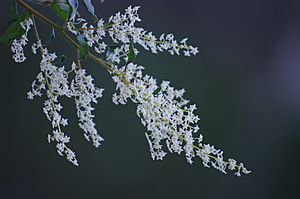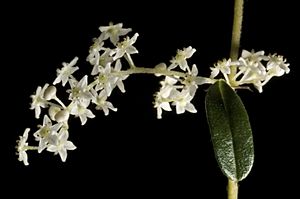Trymalium odoratissimum facts for kids
Quick facts for kids Trymalium odoratissimum |
|
|---|---|
 |
|
 |
|
| Trymalium odoratissimum subsp. odoratissimum | |
| Scientific classification |
|
| Kingdom: | Plantae |
| Clade: | Tracheophytes |
| Clade: | Angiosperms |
| Clade: | Eudicots |
| Clade: | Rosids |
| Order: | Rosales |
| Family: | Rhamnaceae |
| Genus: | Trymalium |
| Species: |
T. odoratissimum
|
| Binomial name | |
| Trymalium odoratissimum |
|
| Subspecies | |
|
See text |
|
| Script error: The function "autoWithCaption" does not exist. | |
Script error: No such module "Check for conflicting parameters".
Trymalium odoratissimum is a special plant found only in Southwest Australia. It belongs to a group of plants called Trymalium. This plant is known for its beautiful appearance and interesting history.
Contents
Discovering Trymalium odoratissimum
How Scientists Name Plants
Scientists give every living thing a unique name. This helps everyone around the world know exactly which plant or animal they are talking about. The name Trymalium odoratissimum was first officially written down in 1838.
The First Description
A famous plant expert named John Lindley published the description of this plant. He wrote about it in a book called Edwards Botanical Register. He mentioned that a person named Robert Mangles helped him. Robert Mangles sent a flowering plant from the Australian colony to a plant society in London. This helped scientists learn about new plants from far away lands.
Different Types of Trymalium odoratissimum
Just like there can be different types of dogs, there can be different types of the same plant species. These are called subspecies. Scientists have found two main subspecies of Trymalium odoratissimum.
Trymalium odoratissimum subsp. odoratissimum
This is the original type of the plant. It mostly grows in an area called the Swan Coastal Plain. This area is located north of the city of Perth in Western Australia.
Trymalium odoratissimum subsp. trifidum
This second type was officially recognized more recently, in 2008. Scientists like Rye, Kellermann, and K.R.Thiele helped to identify it. This subspecies used to be known by another name, Trymalium floribundum. But now, scientists agree it's a subspecies of Trymalium odoratissimum.
Common Names for Trymalium odoratissimum subsp. trifidum
This subspecies has a common name that people use every day: karri hazel. It is also known by a special name in the Nyungar language, which is spoken by the Aboriginal people of this region. They call it djop born.
 | Isaac Myers |
 | D. Hamilton Jackson |
 | A. Philip Randolph |

